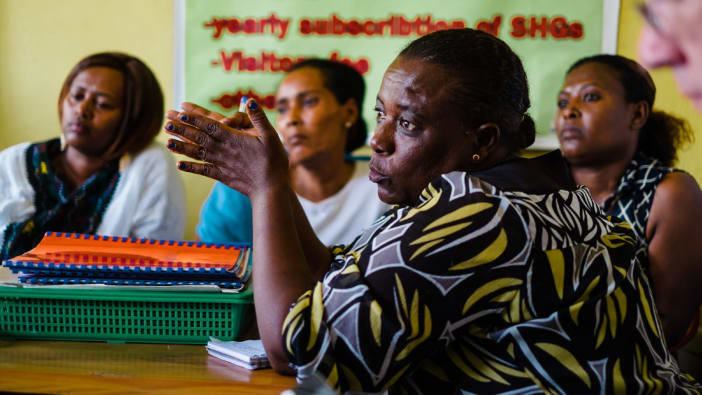Sabera*, in Afghanistan, used to beat her children and pull out chunks of her own hair. She had no interest in money, her house or even her family. She did not care if she lived or died.
For seven years, Sabera suffered from severe depression. It started after two of her children died and her husband had a serious accident.
‘We did not know why she was sick or what was wrong with her,’ says Sabera’s husband, Isaaq*. ‘We did not know anything about mental health or that Sabera’s condition could be treated.’
There are strong connections between people’s social situations and their mental health. For example, poverty, gender inequality, violence, poor physical health or financial concerns may result in poor mental health. Equally, mental health conditions may cause or deepen poverty. This is particularly the case when families have little understanding of mental health or cannot access the support they need.
Where support is available, the stigma and shame associated with mental health conditions may stop people from accessing it. Stigma may also cause people to withdraw from social contact, or keep family members hidden at home.
By involving the whole community in supporting people affected by poor mental health, some of these problems can be overcome.
Recovery
When Sabera heard about the mental health support being offered by Tearfund’s partner, she agreed to meet with one of their counsellors. She was offered talking therapy and appropriate medication, and she soon started to feel better.
At the same time, Tearfund’s partner was working with local volunteers and organisations to increase their understanding of mental health and their support for people affected by mental health conditions. As a result, Sabera was given silkworms by her local community council, allowing her to start a small business. With the money made from the business she bought some livestock.
Being able to earn money and engage in meaningful work contributes as much to many people’s recovery and self-esteem as access to medication and counselling. ‘I am very happy,’ says Sabera. ‘Now, I value my life and my family.’
Isaaq, who had been struggling to work while also looking after Sabera and their nine children, says, ‘Now, our life is ten times better than before!’
Through the wider influence of Tearfund’s partner in the region, six television companies are broadcasting regular programmes about mental health and the government of Afghanistan has asked for training in positive behaviour management for staff from their kindergartens.
*names changed
How to involve communities
- Take time to understand the local situation and build trust and strong relationships. Community members and local staff and volunteers can all help with this.
- Engage passionate and committed staff/volunteers who want to see positive change and who are willing to break the silence around mental health.
- Be flexible and respond to different needs that local organisations/community groups have for training and support. Recognise that understanding of mental health is often weak and behaviour change, not just knowledge transfer, is important.
- Bring local faith and community groups together so they can learn from each other and develop joint initiatives.
- Make sure organisations and community groups know how to refer people to specialist psychiatric services, where available.
- Work with local media outlets (radio stations, newspapers) to share messages about social inclusion and mental health.
- If possible, take government officials to see your work. This often increases their support for a community-based approach to mental health care and may result in funding to expand the project.









